
GLENN LONEY'S SHOW NOTES
By Glenn Loney, April 15, 2002

| |
|
Caricature of Glenn Loney by Sam Norkin. |
|
[02] No More Telephone Plays
[03] "Rembrandt's Gift" from Tina Howe
[04] "Bake Off" and Other 10-Minute Plays
[05] Bernstein & Bogart Know the "Score"
[06] Mee's "Limonade" on the Seine
[07] Mixed-Marriage Blues in "a. m. Sunday"
[08] "Mystery of Attraction" a Mystery
[09] Farting & Peeing in "Finer Noble Gases"
[10] "Snapshot" Out of Focus
[11] Horton Foote Wins Again!
You can use your browser's "find" function to skip to articles on any of these topics instead of scrolling down. Click the "FIND" button or drop down the "EDIT" menu and choose "FIND."
How to contact Glenn Loney: Please email invitations and personal correspondences to Mr. Loney via Editor, New York Theatre Wire. Do not send faxes regarding such matters to The Everett Collection, which is only responsible for making Loney's INFOTOGRAPHY photo-images available for commercial and editorial uses.
How to purchase rights to photos by Glenn Loney: For editorial and commercial uses of the Glenn Loney INFOTOGRAPHY/ArtsArchive of international photo-images, contact THE EVERETT COLLECTION, 104 West 27th Street, NYC 10010. Phone: 212-255-8610/FAX: 212-255-8612.
For archival versions of Glenn Loney's past columns, please try our internal search engine.
At Actors Theatre Louisville:
26th Annual Humana Festival
Of NEW AMERICAN PLAYS
This March began a New Era for the distinguished Humana Festival of New American Plays at Actors Theatre Louisville. Jon Jory—after many a season of developing the festival into the premiere American Showcase for new dramas and playwrights—had departed for Seattle and new theatre-challenges. He of course took his prize-winning playwriting alter-ego Jane Martin along with him. After staying the course at the Yale School of Drama, Jory became a founder of New Haven's Long Wharf Theatre. Possibly sensing that Yale's hometown wasn't big enough for both him and Long Wharf's longtime artistic director Arvin Brown, Jory found a new haven in Louisville. In the process, he made it almost as famous for theatre as it is for the Kentucky Derby and Louisville Slugger.
Jory has been succeeded—if not replaced—by Marc Masterson. He spells his given name with a C, not a K. This may be mere pretension, but it could indicate an especially sensitive intuition in matters artistic.
Certainly some of the play-choices were rather different than scripts chosen during Jory's tenure. Unfortunately, several were not as interesting or inventive as in previous seasons. But that may well be a function of diminishing dramatic talents in a generally dumbed-down American Cultural Landscape. Perhaps good new plays are just Not Out There anymore?
At Last, No Telephone-Plays!
A standard feature of the Humana Festival in recent seasons was the Telephone Plays. Lifting the receiver on one of the bank of pay-phones in the Actors Theatre mezzanine, you could eavesdrop on a conversational mini-drama. It was a cute idea, and you didn't have to deposit another quarter after the first three-minutes.But—as with public phones on the street—you always ran the risk of contracting an ear-infection from a previous user of the handset. Fortunately, some of the phone-plays were infectious on their own terms.
These Bell/NYNEX/Verizon dramas have been replaced with technology of another sort, provided by The Technology Project! The three playwrights who "interfaced" with technologies that ranged "from the mundane to the mind-boggling" were Alice Tuan with F. E. T. C. H. , Sarah RuhlwithVirtual Meditation #1, and John Belluso with Voice Properties (On a First Date After a Full Year of Februarys) .
Ms. Ruhl's project was created in collaboration with students and faculty of Carnegie-Mellon's Entertainment Technology Center. Eric Johnson directed the entire triad of experiments.
As with the stunning new 36 Views—created at Berkeley Rep and now on view at Manhattan's Public Theatre—multi-media productions are defining new parameters of what is possible as Live Theatre becomes involved with complex technologies.
That the results may occasionally be baffling or audience-unfriendly is par for the course. As with the super-trendy artworks on exhibition in the public-spaces of Actors Theatre.
A number of these could have been borrowed from the current Whitney Biennial of New American Art. They don't just hang there on the wall or stand there on the floor. Some require machines to animate them, circuits to make them sparkle, or video-booths for viewing.
Louisville artists were rightly and prominently represented. But there were also some Famous Names on view: Tony Oursler and Bruce Nauman, for instance.
But deliberately blurred photography is still in vogue, at least at Actors Theatre. So, do NOT discard those prints and slides which look like lens or lighting glitches! They could get you a slot in the next Whitney. Or Fame at MoMA! At the very least: exposure at Actors Theatre Louisville!
The Critics & Producers Humana Festival Weekend—when the March-April premieres are all played in rep—would not be complete without a Panel. Sometimes, these can be very self-serving—to the panel-members, rather than to the audiences.
This year's Panel, chaired by Philip Arnoult, was titled NEW VOICES/NEW DIRECTIONS IN EASTERN AND CENTRAL EUROPE. Jim Nicola, of the New York Theatre Workshop, and Jim O'Quinn of American Theatre, balanced the Opposite Poles of Marlgozoata Semil and Zbigniew Brzoza of Warsaw.
Before the Fall of the Berlin Wall—and for a few years after—I used to be a regular at Warsaw, Krakow, and Wroclaw Festivals. What I sensed then—and what is now being experienced in Mittel Europa as well—is a waning interest in the avant-garde, especially among young people who have better things to do than go to the theatre. Also, government subsidies are being curtailed.
From Tina Howe:
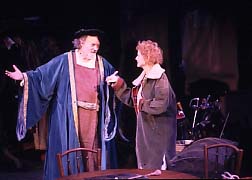 |
| FRED MAJOR & PENNY FULLER IN TINA HOWE'S "REMBRANDT'S GIFT." Photo: ©Larry Hunt/2002. |
REMBRANDT'S GIFT
It was reported that playwright Tina Howe—Painting Churches—wrote this charming new comedy for actor Fred Major. She thought he looked like Rembrandt, so she wrote the play for him, it's said.She was there. I should have asked her about the drama's genesis. One thing is certain: this is going to receive a lot of regional productions. And it surely ought to be soon seen Off-Broadway.
Through some odd Time/Space Quirk/Quark, a famished, bankrupt Rembrandt suddenly appears in the cluttered loft of quirky, obsessive ex-actor Walter Paradise and his long-suffering mate, Polly Shaw. Walter has made their landlord-threatened abode a mini-museum of all his faded repertory costumes.
Josef Sommer and Penny Fuller were quite as delightful as Major/Rembrandt. To repay the couple for its hospitality, Rembrandt offers a few small-denomination Dutch coins. In 2002, however, they are worth a fortune to collectors.
But Rembrandt's Gift is more than this. He inspires Polly to relaunch her career as a photographer. Lenswoman Cindy Sherman has made herself famous dressing up as famous folk, but Polly gets to photograph The Real Thing!
John Rando—of Urinetown fame—directed. The inimitable Paul Owen created the unusual set, as he has done for almost all Humana Festival productions for years. That he can devise striking settings—which can be rapidly struck for a whirlwind repertory weekend—deserves a Special Regional Tony Award.
How Long Is Ten-Minutes?
There was a time when the festival's ten-minute plays watched the clock rather carefully. This year there were only three of them on view, and they all seemed longer than ten minutes.Of course it is something of stunt to write a complete drama which takes less than a quarter-of-an-hour to unfold and resolve itself. Some notable American playwrights have managed this very skillfully at the Humana. And some have failed dismally…
Sheri Wilner's BAKE OFF
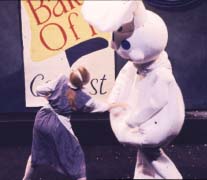 |
| BEATING UP THE DOUGHBOY
IN SHERI WILNER'S "BAKE OFF." Photo: ©Larry Hunt/2002. |
Such two or three-play matchings are not easy to make. There was a time when Joe Ortonhad hoped his short BBC radio-drama, Ruffian on the Stair, might be paired with Peter Shaffer's short Black Comedy. Both Joe and Peter had sought a match—and I was the intermediary. But, in the meantime, Joe wrote The Earpingham Camp and Peter created White Liars as their own companion-pieces.
Wilner imagines a duelling male-female duo in the Pillsbury Bake-Off. Kim Martin-Cotten was hilariously out-of-control as a thoroughly threatened woman, outraged that a mouse of a man [Jeffrey Bean] has dared to enter what she regards as the Last Bastion of Female Supremacy: "This is Ours! This Belongs to Us!"
She even assaults the Pillsbury Doughboy, grabbing for apparently non-existent floury genitals.
Sullivan Canaday White staged the duo on the heights of Paul Owen's 10-minute unit-set. This is now essentially what used to be called a "skit." It could be enlarged, but it works very well in this short-format.
Caleen Sinnette Jennings' CLASSYASS
This was also very amusing—but surely longer than the classical ten-minutes? A young African-American disk-jockey on a college classical-music station is confronted in the studio by a raging and outrageous Sister. She has an Agenda that he is not addressing in his broadcasts.She turns out to be the Dean's daughter, disguised. This show should also be very popular with young performers and audiences.
Julia Jordan's NIGHTSWIM
Somehow, I found it difficult to follow the conversations of Rosie and Christina, and not just because this play seemed much longer than ten minutes. That may be because it is a Woman's Play.
Major Dramatic Efforts
By Humana Old-Timers:
The Humana Festival is of course one of America's most important venues for new American Plays. But production is not limited to first-time playwrights. Old favorites return with new plays as well. Anne Bogart Conducts Bernstein's SCORE
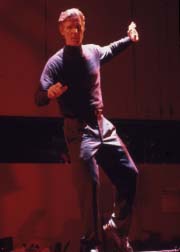 |
| TOM NELIS BEING
BERNSTEIN IN ANNE BOGART'S "SCORE." Photo: ©Larry Hunt/2002. |
They imagine Leonard Bernstein—loping and prancing around a stage littered with toppled music-stands—discoursing on music in general and on his amazing career. As he proved very popular as a conductor on guest-forays into Europe, there is a ready-made audience for this show across the Atlantic.
Bernstein was especially admired for his physical and emotional response to the scores he was conducting. This bothered some American music-critics, but Europeans found this intimate involvement with the music Bernstein loved and admired totally endearing. And Very American!
Every utterance Nelis makes, artfully moving and weaving about the state, is taken from some Bernstein commentary or memoir. One of my colleagues, who is a music-specialist, found this less than inspiring or original.
She would have preferred imaginary Bernstein Dicta, based on things he had actually said or written, but more freshly and tartly phrased. She has a point.
I found the piece over-long, even had it been delivered from a podium as an arts-lecture. Nelis' very graceful leaps, strides, and artful hand-movements—more balletic than Bernsteinian—were obviously calculated to overcome the lecture-format.
But they were ultimately tiresome and repetitive. Perhaps Bogart and Nelis would like to try miming and mining James Levine?
Charles L. Mee's LIMONADE TOUS LES JOURS
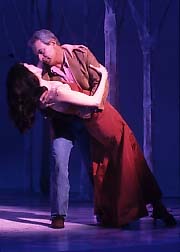 |
| PARISIAN ROMANCE
IN CHAS. L. MEE'S "LIMONADE TOUS LES JOURS." Photo: ©Larry Hunt/2002. |
Much given to satire and parody of social and cultural modes, Mee has created something quite different in Limonade Tous les Jours. In fact, you may already have seen its slightly fey romantic story up there on the silver-screen.
A satiric or mocking edge would have made this work much more interesting. As it was, the brief encounter of an aging American on holiday in Paris [Tom Teti] with a charming chanteuse [Christa Scott-Reed], also at liberty, seemed Old Stuff. She looked young but experienced. He looked aging, but that may just have been his essential boredom and banality.
Unfortunately, neither of them was very interesting as a character. Though he did have a video-camera as an appendage—permitting some multi-media design effects.
Not so long ago, this camera could have certified him as an American. But now, every noisy European tourist also has his or her SONY literally on-hand to record the most banal moments of their summer vacations.
This would have been little more than another Ten-Minute Play, were it not for pleasant vocal interludes, which could qualify it as a mini-musical.
Altogether too slight for the apparent talents of Mr. Mee. The program curiously noted that his "work is made possible by the support of Richard B. Fisher & Jeanne Donovan Fisher."
Does that mean that Charles L. Mee's "work" is not made possible by his own inspiration and hard work? What would happen, should the Fishers withdraw their generous support?
Would Mee, like Shakespeare, have to slink back to Stratford-Upon-Avon? To quit the scene because Christopher Marlowe—whom some think made the Bard's Works "possible"—had died and so no longer needed a Front-Man?
Still, it's nothing to be ashamed of, to be a front-man—or parodic adapter—for Aeschylus, Sophocles, or Euripides. Mee's Big Love is still very big with me!
New Voices/Old Keyboards/Too Much TV:
Disappointing as some of the new plays were, it must be noted that the performances were almost uniformly outstanding. For some seasons now, it has been apparent on Broadway—not only in Louisville and other regional theatres—that the actors are often superior to the work in which they appear.Certainly actors have always had to "flesh-out" a playwight's characters and conceptions. In the process—aided of course by able directors—they often add a dimension and depth which is not apparent in the raw texts.
Nor can actors read George Bernard Shaw's italicized stage-directions out loud, amusing and incisive as they often are. Players have to make them emotional and physical realities through performance.
Today, most playwrights avoid paranthetical stage-directions. They trust directors and actors more than Shaw did.
But it's a long time since the Humana Festival has had a script even roughly approximating the genius of GBS. So it is even more admirable that the current company did so well by the New American Plays they were required to animate.
There are a number of young players at Actors Theatre who should become better and more widely known to American audiences. Unfortunately for the theatre, the best way to do this now is to be cast in a popular TV series.
When it eventually dies, you can live from the residuals and opening new Malls…
Jerome Hairston's a. m. SUNDAY
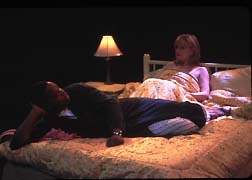 |
| RAY ANTHONY THOMAS & BARBARA GULAN IN "a.m. SUNDAY." Photo: ©Fred Furow III/2002. |
If there's one thing most New American Plays have in common it's their debt to television. Rather than to what is now laughingly called Real Life.
Barbara Gulan was interesting as the troubled Anglo wife of a proud and difficult African-American, strongly played by Ray Anthony Thomas. Jason Cornwell and Tarah Flanagan were TV-Right for the sulking black son and a pathetic white girl who loves black boys.
Like Father, Like Son the TV series could be called. I'd change channels.
Marlane Meyer's THE MYSTERY OF ATTRACTION
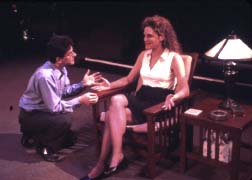 |
| STEVE JUERGENS & CLAUDIA FIELDING IN "MYSTERY OF ATTRACTION." Photo: ©Fred Furow III/2002. |
They have both married the same women, Sharky. In turn. Not simultaneously.
Unfortunately, the audience never gets to see her, as she sounds more interesting than those they do get to see in action and inaction on stage.
At the close, however, we learn that Sharky is just outside, buried in her first husband's garden, by her second husband, who has been responsible for her pitiful and painful death. This would have been something worth watching, but it was not to be.
Instead, it's all talk, as Brother #1 is threatened with having his penis sliced off by the mysterious Bone Man. He is a highly principled lawyer—who, as a result, has no legal living. He has also lost heavily on the ponies, but thinks he can recoup with another go.
He wants his long-suffering second-wife—who waitresses—to give him her savings to pay off his dangerous debt. And maybe place an extra bet on the side?
The brothers—in the casting, playing, and the writing—do not seem remotely related.
Nonetheless, the ensemble was admirable in its execution of this soi-disant "edifying entertainment."
Adam Rapp's FINER NOBLE GASES
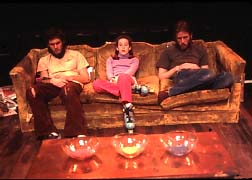 |
| SOFA-TIME BETWEEN FARTS IN "FINER NOBLE GASES." Photo: ©Fred Furow III/2002. |
Rapp imagines an impossibly trashy pad, with two zonked-out druggies on a broken-down sofa. Bowl of pink and blue pills are in front of them. Before a mountain of empty fast-food cartons, lies a silent virtually nude zonker.
A mysterious masked-man enters, strides across the room, kicks in the TV monitor, and disappears into an adjacent bedroom. The duo on the divan plot sneaking downstairs to steal the TV of a mousy, obsessive tenant—who later joins them for drugs, with disastrous results.
There's also a pre-teen girl on roller skates in a huge elephant-mask, found in the park by the masked-man.
The Noble Gases apparently refer to the periodic noisy farts of one of the chesterfield occupants. Actors Theatre audiences obviously watch a lot of TV, for every gusty launch of a newly minted fart brought forth lusty laughter. Gawd, What Fools These Mortals Be!
The Fartophile also managed to upchuck very noisily a large volume of undigested food on the floor beside the sofa. At this point, a New York critic sitting next to me rapidly fled for the exit.
I stayed the course, to see what other visual excesses were on offer. At length, the comatose near-naked form on the floor rose to pee into a pail.
To the astonishment and amazement of the audience, he continued to pee and to pee and to pee. Some said it was longer than five minutes. It did seem An Eternity.
Several of my colleagues asked me: "How did he do that?" As if I had any expertise in extended urination. Watching Urinetown, The Musical is no help at all.
Late in the day and the play, there was a sudden flashback as the druggies played a set on drums, keyboards, and guitars. If this was intended to underline how far they had fallen from their initial artistic aspirations, it didn't quite achieve that effect.
Rock was not their Finest Hour. But they seemed Masters of the Diverse Arts of Voiding Bodily Fluids and Vapors!
This was also not an "edifying entertainment." But the able ensemble did everything playwright Adam Rapp and the director—Michael John Garcès—asked of them. And more and more and more…
This production made Jack Gelber's once shocking Living Theatre druggie-drama, The Connection, seem as tame as Peter and Wendy.
Out-of-Focus SNAPSHOT
A regular feature of the Humana Festival is a program of monologues or short-scenes by the Apprentice Actors of Actors Theatre. This often showcases outstanding new talents, as well as arresting snippets of new writing.While several of the young performers did suggest nascent promise, most of the material with which they had to work did not.
This despite the contributions of Humana veterans such as Lynn Nottage, David Lindsay-Abaire, and Lee Blessing.
The thematic title of this uneven program referred to photographer Lee Friedlander's famed photo-image: Mount Rushmore, 1969.
This proved a constricting—rather than liberating—point of departure for most of the playwrights. Some of the mini-monologues or scenes were referential to the image of Rushmore as symbol, monument, or National Park—without being notably revelatory of anything human, man-made, or geological.
Lee Blessing, however, proved a blessing with his amusing Tyler Poked Taylor.
Horton Foote Wins Again!
As in the past few years, the Humana Festival was again the venue for awarding the annual American Theatre Critics/Steinberg New Play Award. This season's winner was Horton Foote—already crowned with playwriting laurels—for his threesome of monologues, The Carpetbagger's Children. This triologue has been on view at Lincoln Center, featuring Hallie Foote, Jean Stapleton, and Roberta Maxwell.In addition to Foote's performance royalties, the venerable dramatist now has a cash-award of $15,000. Obviously, Foote doesn't need this to encourage him to write more New American Plays. But it would be a challenge were he to site his next drama in Thailand, rather than Texas.
There were also two Citations, each with a $5,000 check. One went to Jeffrey Sweet, for his The Action Against Sol Schumann, premiered by Chicago's Victory Gardens Theatre.
Murray Mednick was also honored for his Joe and Betty, premiered in Los Angeles by Padua Playwrights Productions.
Inaugurated in 1977, the New Play Award is funded by the American Theatre Critics Association [I gave!] and the Harold and Mimi Steinberg Charitable Trust. For the record, the Steinberg Trust and the Steinberg Family have demonstrated repeatedly an admirably well-informed generosity to the Performing Arts.
Meet Me Next Spring in Louisville, Not in St. Louis!
All the many friends of the Humana Festival and of Actors Theatre Louisville are looking forward to Spring 2003! What lessons will have been learnt from this past season? What new Wonders of American Playwriting will have emerged? [Loney]Copyright © Glenn Loney 2002. No re-publication or broadcast use without proper credit of authorship. Suggested credit line: "Glenn Loney, New York Theatre Wire." Reproduction rights please contact: jslaff@nytheatre-wire.com.
| museums | recordings | coupons | publications | classified |